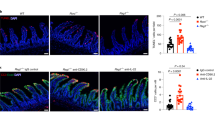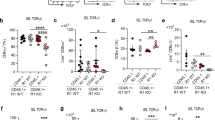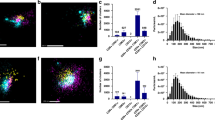Abstract
Necrotizing enterocolitis (NEC) seems to result from the inflammatory response of an immature intestine. Human milk is protective against NEC via an unknown mechanism. We hypothesized that specific factors found in human milk would decrease stimulated IL-8 secretion in intestinal epithelial cells. HT29-cl19A and Caco2 cells were compared with the fetal human primary intestinal epithelial cell line H4 and temperature-sensitive conditionally immortalized fetal human intestinal (tsFHI) cells. Cells were pretreated with transforming growth factor-β (TGF-β), erythropoietin (Epo), IL-10, or epidermal growth factor (EGF) at physiologic concentrations before stimulation with tumor necrosis factor-α (TNF-α) or IL-1β, and then IL-8 was measured by ELISA. The fetal cells produced significantly more IL-8 when stimulated by TNF-α or IL-1β. There were also differences in the pattern of alteration of IL-8 secretion by human milk factors. In HT29-cl19A cells, IL-10 inhibited TNF-α-stimulated IL-8 secretion by 52%, and EGF increased secretion by 144%. In H4 cells, TGF-β1 and Epo inhibited TNF-α-stimulated IL-8 secretion to control levels, and EGF increased secretion by 29%. IL-1β-stimulated IL-8 secretion was inhibited 25% by TGF-β1 in Caco2 cells and in H4 cells was inhibited by TGF-β1, Epo, and TGF-β2. TsFHI cells confirmed H4 cell results. Fetal human enterocytes have an exaggerated IL-8 secretion in response to TNF-α and IL-1β. TGF-β and Epo decrease this stimulated IL-8 secretion, which may partially explain the protective effect of human milk in NEC.
Similar content being viewed by others
Log in or create a free account to read this content
Gain free access to this article, as well as selected content from this journal and more on nature.com
or
Abbreviations
- DMEM:
-
Dulbecco's modified Eagle's medium
- EGF:
-
epidermal growth factor
- Epo:
-
erythropoietin
- FBS:
-
fetal bovine serum
- IEC:
-
intestinal epithelial cell
- NEC:
-
necrotizing enterocolitis
- NF-κB:
-
nuclear factor κB
- SV40:
-
simian virus 40
- TGF-β:
-
transforming growth factor-β
- TNF:
-
tumor necrosis factor
- TsFHI:
-
temperature-sensitive fetal human intestinal cells
References
Molmenti EP, Ziambaras T, Perlmutter DH 1993 Evidence for an acute phase response in human intestinal epithelial cells. J Biol Chem 268: 14116–14124
Nanthakumar NN, Fusunyan RD, Sanderson I, Walker WA 2000 Inflammation in the developing human intestine: a possible pathophysiologic contribution to necrotizing enterocolitis. Proc Natl Acad Sci U S A 97: 6043–6048
Sanderson IR, Xu Z, Chu SW, Xie QY, Levine LJ, Walker WA 1996 Developmental differences in the expression of the cholera toxin sensitive subunit (Gs alpha) of adenylate cyclase in the rat small intestine. Gut 38: 853–858
Stadnyk AW 1994 Cytokine production by epithelial cells. FASEB J 8: 1041–1047
Chu SH, Walker WA 1993 Bacterial toxin interaction with the developing intestine. Gastroenterology 104: 916–925
Ciarlet M, Conner ME, Finegold MJ, Estes MK 2002 Group A rotavirus infection and age-dependent diarrheal disease in rats: a new animal model to study the pathophysiology of rotavirus infection. J Virol 76: 41–57
Claud EC, Walker WA 2001 Hypothesis: inappropriate colonization of the premature intestine can cause neonatal necrotizing enterocolitis. FASEB J 15: 1398–1403
Udall JN 1990 Gastrointestinal host defense and necrotizing enterocolitis. J Pediatr 117: S33–S43
Grazioso CF, Werner AL, Alling DW, Bishop PR, Buescher ES 1997 Antiinflammatory effects of human milk on chemically induced colitis in rats. Pediatr Res 42: 639–643
Lucas A, Cole TJ 1990 Breast milk and neonatal necrotizing enterocolitis. Lancet 336: 1519–1523
Newburg DS 2000 Oligosaccharides in human milk and bacterial colonization. J Pediatr Gastroenterol Nutr 30: S8–S17
Goldman AS, Garza C, Nichols BL, Goldblum RM 1982 Immunologic factors in human milk during the first year of lactation. J Pediatr 100: 563–567
Goldman AS, Goldblum RM, Hanson LA 1990 Anti-inflammatory systems in human milk. Adv Exp Med Biol 262: 69–76
Moya FR, Eguchi H, Zhao B, Furukawa M, Sfeir J, Osorio M, Ogawa Y, Johnston JM 1994 Platelet-activating factor acetylhydrolase in term and preterm human milk: a preliminary report. J Pediatr Gastroenterol Nutr 19: 236–239
Bernt KM, Walker WA 1999 Human milk as a carrier of biochemical messages. Acta Paediatr Suppl 88: 27–41
Edelson MB, Bagwell CE, Rozycki HJ 1999 Circulating pro- and counterinflammatory cytokine levels and severity in necrotizing enterocolitis. Pediatrics 103: 766–771
Caplan MS, Sun XM, Hseuh W, Hageman JR 1990 Role of platelet activating factor and tumor necrosis factor-alpha in neonatal necrotizing enterocolitis. J Pediatr 116: 960–964
Kosloske AM 1994 Epidemiology of necrotizing enterocolitis. Acta Paediatr Suppl 396: 2–7
Musemeche C, Caplan M, Hsueh W, Sun X, Kelly A 1991 Experimental necrotizing enterocolitis: the role of polymorphonuclear neutrophils. J Pediatr Surg 26: 1047–1050
Baggiolini M, Walz A, Kunkel SL 1989 Neutrophil-activating peptide-1/interleukin 8, a novel cytokine that activates neutrophils. J Clin Invest 84: 1045–1049
Djeu JY, Matsushima K, Oppenheim JJ, Shiotsuki K, Blanchard DK 1990 Functional activation of human neutrophils by recombinant monocyte-derived neutrophil chemotactic factor/IL-8. J Immunol 144: 2205–2210
Huber AR, Kunkel SL, Todd RF, Weiss SJ 1991 Regulation of transendothelial neutrophil migration by endogenous interleukin-8. Science 254: 99–102
Nadler EP, Stanford A, Zhang XR, Schall LC, Alber SM, Watkins SC, Ford HR 2001 Intestinal cytokine gene expression in infants with acute necrotizing enterocolitis: interleukin-11 mRNA expression inversely correlates with extent of disease. J Pediatr Surg 36: 1122–1129
Lane JS, Todd KE, Lewis MP, Gloor B, Ashley SW, Reber HA, McFadden DW, Chandler CF 1997 Interleukin-10 reduces the systemic inflammatory response in a murine model of intestinal ischemia/reperfusion. Surgery 122: 288–294
Kulkarni AB, Karlsson S 1993 Transforming growth factor-beta 1 knockout mice. A mutation in one cytokine gene causes a dramatic inflammatory disease. Am J Pathol 143: 3–9
Kuhn R, Lohler J, Rennick D, Rajewsky K, Muller W 1993 Interleukin-10-deficient mice develop chronic enterocolitis. Cell 75: 263–274
Ledbetter DJ, Juul SE 2000 Erythropoietin and the incidence of necrotizing enterocolitis in infants with very low birth weight. J Pediatr Surg 35: 178–181; discussion 182
Dvorak B, Halpern MD, Holubec H, Williams CS, McWilliam DL, Dominguez JA, Stepankova R, Payne CM, McCuskey RS 2002 Epidermal growth factor reduces the development of necrotizing enterocolitis in a neonatal rat model. Am J Physiol 282: G156–G164
Augeron C, Laboisse CL 1984 Emergence of permanently differentiated cell clones in a human colonic cancer cell line in culture after treatment with sodium butyrate. Cancer Res 44: 3961–3969
Sanderson IR, Ezzell RM, Kedinger M, Erlanger M, Xu ZX, Pringault E, Leon-Robine S, Louvard D, Walker WA 1996 Human fetal enterocytes in vitro: modulation of the phenotype by extracellular matrix. Proc Natl Acad Sci U S A 93: 7717–7722
Quaroni A, Beaulieu JF 1997 Cell dynamics and differentiation of conditionally immortalized human intestinal epithelial cells. Gastroenterology 113: 1198–1213
Saito S, Yoshida M, Ichijo M, Ishizaka S, Tsujii T 1993 Transforming growth factor-beta (TGF-beta) in human milk. Clin Exp Immunol 94: 220–224
Bry K, Hallman M 1992 Transforming growth factor-beta opposes the stimulatory effects of interleukin-1 and tumor necrosis factor on amnion cell prostaglandin E2 production: implication for preterm labor. Am J Obstet Gynecol 167: 222–226
Ostlund E, Lindholm H, Hemsen A, Fried G 2000 Fetal erythropoietin and endothelin-1: relation to hypoxia and intrauterine growth retardation. Acta Obstet Gynecol Scand 79: 276–282
Juul SE, Joyce AE, Zhao Y, Ledbetter DJ 1999 Why is erythropoietin present in human milk? Studies of erythropoietin receptors on enterocytes of human and rat neonates. Pediatr Res 46: 263–268
Schottelius AJ, Mayo MW, Sartor RB, Baldwin AS 1999 Interleukin-10 signaling blocks inhibitor of kappaB kinase activity and nuclear factor kappaB DNA binding. J Biol Chem 274: 31868–31874
Pender SL, Breese EJ, Gunther U, Howie D, Wathen NC, Schuppan D, MacDonald TT 1998 Suppression of T cell-mediated injury in human gut by interleukin 10: role of matrix metalloproteinases. Gastroenterology 115: 573–583
Moran JR, Courtney ME, Orth DN, Vaughan R, Coy S, Mount CD, Sherrell BJ, Greene HL 1983 Epidermal growth factor in human milk: daily production and diurnal variation during early lactation in mothers delivering at term and at premature gestation. J Pediatr 103: 402–405
Zijlstra RT, Odle J, Hall WF, Petschow BW, Gelberg HB, Litov RE 1994 Effect of orally administered epidermal growth factor on intestinal recovery of neonatal pigs infected with rotavirus. J Pediatr Gastroenterol Nutr 19: 382–390
Levy E, Thibault L, Menard D 1992 Intestinal lipids and lipoproteins in the human fetus: modulation by epidermal growth factor. J Lipid Res 33: 1607–1617
Eckmann L, Jung HC, Schurer-Maly C, Panja A, Morzycka-Wroblewska E, Kagnoff MF 1993 Differential cytokine expression by human intestinal epithelial cell lines: regulated expression of interleukin 8. Gastroenterology 105: 1689–1697
Bocker U, Schottelius A, Watson JM, Holt L, Licato LL, Brenner DA, Sartor RB, Jobin C 2000 Cellular differentiation causes a selective down-regulation of interleukin (IL)-1β-mediated NF-κB activation and IL-8 gene expression in intestinal epithelial cells. J Biol Chem 275: 12207–12213
Gewirtz AT, Siber AM, Madara JL, McCormick BA 1999 Orchestration of neutrophil movement by intestinal epithelial cells in response to Salmonella typhimurium can be uncoupled from bacterial internalization. Infect Immun 67: 608–617
Roberts AB, Sporn MB 1992 Differential expression of the TGF-beta isoforms in embryogenesis suggests specific roles in developing and adult tissues. Mol Reprod Dev 32: 91–98
Mariadason JM, Velcich A, Wilson AJ, Augenlicht LH, Gibson PR 2001 Resistance to butyrate-induced cell differentiation and apoptosis during spontaneous Caco-2 cell differentiation. Gastroenterology 120: 889–899
Niv Y, Byrd JC, Ho SB, Dahiya R, Kim YS 1992 Mucin synthesis and secretion in relation to spontaneous differentiation of colon cancer cells in vitro. Int J Cancer 50: 147–152
Chantret I, Barbat A, Dussaulx E, Brattain MG, Zweibaum A 1988 Epithelial polarity, villin expression, and enterocytic differentiation of cultured human colon carcinoma cells: a survey of twenty cell lines. Cancer Res 48: 1936–1942
Halac E, Halac J, Begue EF, Casanas JM, Indiveri DR, Petit JF, Figueroa MJ, Olmas JM, Rodriguez LA, Obregon RJ, et al 1990 Prenatal and postnatal corticosteroid therapy to prevent neonatal necrotizing enterocolitis: a controlled trial. J Pediatr 117: 132–138
Caplan MS, MacKendrick W 1993 Necrotizing enterocolitis: a review of pathogenetic mechanisms and implications for prevention. Pediatr Pathol 13: 357–369
Kamitsuka MD, Horton MK, Williams MA 2000 The incidence of necrotizing enterocolitis after introducing standardized feeding schedules for infants between 1250 and 2500 grams and less than 35 weeks of gestation. Pediatrics 105: 379–384
Viscardi RM, Lyon NH, Sun CC, Hebel JR, Hasday JD 1997 Inflammatory cytokine mRNAs in surgical specimens of necrotizing enterocolitis and normal newborn intestine. Pediatr Pathol Lab Med 17: 547–559
Tan X, Hsueh W, Gonzalez-Crussi F 1993 Cellular localization of tumor necrosis factor (TNF)-alpha transcripts in normal bowel and in necrotizing enterocolitis. TNF gene expression by Paneth cells, intestinal eosinophils, and macrophages. Am J Pathol 142: 1858–1865
Jobin C, Holt L, Bradham CA, Streetz K, Brenner DA, Sartor RB 1999 TNF receptor-associated factor-2 is involved in both IL-1 beta and TNF-alpha signaling cascades leading to NF-kappa B activation and IL-8 expression in human intestinal epithelial cells. J Immunol 162: 4447–4454
Ciacci C, Lind SE, Podolsky DK 1993 Transforming growth factor beta regulation of migration in wounded rat intestinal epithelial monolayers. Gastroenterology 105: 93–101
Wagner CL 2002 Amniotic fluid and human milk: a continuum of effect?. J Pediatr Gastroenterol Nutr 34: 513–514
Lee S, Cho YS, Shim C, Kim J, Choi J, Oh S, Zhang W, Lee J 2001 Aberrant expression of Smad4 results in resistance against the growth-inhibitory effect of transforming growth factor-beta in the SiHa human cervical carcinoma cell line. Int J Cancer 94: 500–507
Xie W, Mertens JC, Reiss DJ, Rimm DL, Camp RL, Haffty BG, Reiss M 2002 Alterations of Smad signaling in human breast carcinoma are associated with poor outcome: a tissue microarray study. Cancer Res 62: 497–505
Woodford-Richens KL, Rowan AJ, Gorman P, Halford S, Bicknell DC, Wasan HS, Roylance RR, Bodmer WF, Tomlinson IP 2001 SMAD4 mutations in colorectal cancer probably occur before chromosomal instability, but after divergence of the microsatellite instability pathway. Proc Natl Acad Sci U S A 98: 9719–9723
Ahmed MM, Alcock RA, Chendil D, Dey S, Das A, Venkatasubbarao K, Mohiuddin M, Sun L, Strodel WE, Freeman JW 2002 Restoration of transforming growth factor-beta signaling enhances radiosensitivity by altering the Bcl-2/Bax ratio in the p53 mutant pancreatic cancer cell line MIA PaCa-2. J Biol Chem 277: 2234–2246
van Deventer SJ, Elson CO, Fedorak RN 1997 Multiple doses of intravenous interleukin 10 in steroid-refractory Crohn's disease. Crohn's Disease Study Group. Gastroenterology 113: 383–389
Jones CA, Cayabyab RG, Kwong KY, Stotts C, Wong B, Hamdan H, Minoo P, deLemos RA 1996 Undetectable interleukin (IL)-10 and persistent IL-8 expression early in hyaline membrane disease: a possible developmental basis for the predisposition to chronic lung inflammation in preterm newborns. Pediatr Res 39: 966–975
Fagbemi AO, Wright N, Lakhoo K, Edwards AD 2001 Immunoreactive epidermal growth factor receptors are present in gastrointestinal epithelial cells of preterm infants with necrotising enterocolitis. Early Hum Dev 65: 1–9
Menard D, Pothier P 1991 Radioautographic localization of epidermal growth factor receptors in human fetal gut. Gastroenterology 101: 640–649
Swaniker F, Guo W, Fonkalsrud EW, Diamond J 1995 The effect of epidermal growth factor on mucosal function after ileal resection. J Surg Res 58: 565–569
Miettinen PJ, Berger JE, Meneses J, Phung Y, Pedersen RA, Werb Z, Derynck R 1995 Epithelial immaturity and multiorgan failure in mice lacking epidermal growth factor receptor. Nature 376: 337–341
Shin CE, Falcone RA, Stuart L, Erwin CR, Warner BW 2000 Diminished epidermal growth factor levels in infants with necrotizing enterocolitis. J Pediatr Surg 35: 173–176; discussion 177
Sullivan PB, Brueton MJ, Tabara ZB, Goodlad RA, Lee CY, Wright NA 1991 Epidermal growth factor in necrotizing enteritis. Lancet 338: 53–54
Lemjabbar H, Basbaum C 2002 Platelet-activating factor receptor and ADAM10 mediate responses to Staphylococcus aureus in epithelial cells. Nat Med 8: 41–46
Bry K 1993 Epidermal growth factor and transforming growth factor-alpha enhance the interleukin-1- and tumor necrosis factor-stimulated prostaglandin E2 production and the interleukin-1 specific binding on amnion cells. Prostaglandins Leukot Essent Fatty Acids 49: 923–928
Author information
Authors and Affiliations
Corresponding author
Additional information
This work was supported by NIH grants T32-HD07466-07 (E.C.), R01-HD-31852, R37-HD12437, P01-DK33506, and P30-DK40561.
Rights and permissions
About this article
Cite this article
Claud, E., Savidge, T. & Walker, W. Modulation of Human Intestinal Epithelial Cell IL-8 Secretion by Human Milk Factors. Pediatr Res 53, 419–425 (2003). https://doi.org/10.1203/01.PDR.0000050141.73528.AD
Received:
Accepted:
Issue date:
DOI: https://doi.org/10.1203/01.PDR.0000050141.73528.AD
This article is cited by
-
Impact of Holder pasteurization on immunological properties of human breast milk over the first year of lactation
Pediatric Research (2020)
-
Protective effects of amniotic fluid in the setting of necrotizing enterocolitis
Pediatric Research (2017)
-
Long-chain polyunsaturated fatty acids attenuate the IL-1β-induced proinflammatory response in human fetal intestinal epithelial cells
Pediatric Research (2015)
-
Lactobacillus rhamnosus GG and its SpaC pilus adhesin modulate inflammatory responsiveness and TLR-related gene expression in the fetal human gut
Pediatric Research (2015)
-
The effect of dietary intake of the acidic protein fraction of bovine colostrum on influenza A (H1N1) virus infection
Journal of Microbiology (2013)



